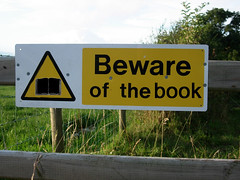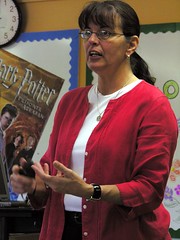
Newsletter July 2009
Greetings CK-12 Community!In this issue:
- California Digital Textbooks Initiative
- Introduction to CK-12 Content Manager Gary Clarke
- Interview with Juli Weiss and Annamaria Farbizio, CK-12 Science and Math Editors
- Update on Support and Twitter
California Digital Textbooks Initiative
If you live in California, you have probably noticed that digital textbooks are in the news lately. Governor Schwarzenegger issued a call to educators and publishers to submit standards-aligned textbooks in the areas of science, technology, engineering, and math by June 15th. We are proud to have met that deadline. It has been a great group effort with all of our authors, editors, domain experts, copyeditors, and internal content staff working together towards this important goal. The books are available for download here. They are Calculus, Geometry, Trigonometry, Biology, Chemistry, Earth Science, and Life Science.
Introduction to CK-12 Content Manager Gary Clarke
In other CK-12 news, our internal staff has grown. We have added Gary Clarke as Content Manager. Gary joins CK-12 with over thirteen years of experience in educational and web-content publishing. We couldn’t be happier to have him.
Gary gave us a short bio to share: “I am very excited about joining CK-12. After spending many years in educational publishing and IT Web publishing, I wanted to work for a top-notch team that brought those two worlds together. Delivering high- quality online educational content over the Web and building a thriving online educational community, all in support of an open education mission…now what could be better than that! For the past nine-plus years, I have gained experience in online Web publishing and online community building with Catapulse, Rational Software, a little company called IBM (developerWorks) and an even smaller one, Microsoft (MSDN). Prior to that, I spent six years with Pearson and Key Curriculum Press. I attended the London School of Economics, University of London, University of Southern California, and taught logic and philosophy for one year at Manchester University. I have a wife, Joze! fa, and two very small children, Oliver (4 years) and Abigail (14 months.) I have no free time whatsoever!”
Interview with Juli Weiss and Annamaria Farbizio, CK-12 Science and Math Editors
CK-12’s content team are:
- Gary Clark, Content Manager
- Annamaria Farbizio, Math Leader and Editor
- Gil Hoskins, Curriculum Alignment Specialist
- Juli Weiss, Science Leader and Editor
They are joined this summer by a fantastic group of high school interns. See more info about all of the CK-12 team here. The Newsletter sat down with Juli Weiss and Annamaria Farbizio to talk about CK-12’s unique content creation process.
CK-12 Newsletter: Tell me a little about the CK-12 Publishing Process- How do you create digital textbooks?
Juli Weiss: CK-12 is committed to creating comprehensive K-12 STEM curricula written to state and national standards. One of CK-12’s key differentiators is our academic and comprehensive approach to developing our seeded content. For example, for our California editions, our book outlines were written to California and national standards. Science content was aligned to California, National Science Education Standards (NSES), as well as the American Association for the Advancement of Science (AAAS) Project 2061 Benchmarks whenever possible. Math content is aligned to California and National Council of Teachers in Mathematics (NCTM) standards. There are three ways we obtain content: 1) seeded content, which is commissioned by CK-12; 2) donated content, which is given to us by authors, and 3) “harvested”content, which is created by authors using our FlexBooks application and readily available open educational resources.
Annamaria Farbizio: We start out by interviewing different authors who have teaching experience and expertise in their subject. They do a sample chapter which is checked by a domain expert and in-house at CK-12. Once authors come on board they start writing chapters based on an outline, which has already been created according to curriculum standards. The chapter goes back and forth between the author and the Domain Expert. The Domain Expert works with the author as well as the Book Manager at CK-12. This collaboration really adds to the quality of the books.
After a chapter is written, we send it out to reviewers. It’s important to get the outside perspective, because in-house we can be very focused on the timeline. The CK-12 publication process happens over a shorter timeline than a traditional publishing process.
Newsletter: What is a domain expert (DE)?
Weiss: Our domain experts have expertise in their subject matter. They all have advanced degrees, extensive teaching experience, and significant experience in curriculum development complying with state and national standards. Their role is to ensure our content has integrity and to provide quality control and quality assurance.
Farbizio:Part of the domain expert’s role is to help make the writing stronger by working with authors to get them to perform at their best level. They work to incorporate feedback from the reviewers as well as the technical reviewers. They’re like book coaches, in a way, because in addition to having subject matter expertise, being able to look through the material and make sure that it is accurate, make sure that it’s presented well, all of these things that we’re asking them to do…the most successful ones are able to really inspire the authors to perform at their best level.
Newsletter: So what is the reviewer’s role?
Weiss: Similar to our domain experts, reviewers serve to vet and ensure integrity of content. They provide developmental content reviews evaluating pedagogical integrity, alignment to standards, and accessibility. Accuracy checks are conducted by technical reviewers and copyeditors review the manuscript for typos and grammatical errors. Seeded content is reviewed by six independent reviewers and their comments are synthesized into our final manuscripts by the domain experts and the book managers. Our checks and balances are in place to ensure we provide users high quality content.
It may be of interest to our readers to explain our recruiting process – our science and math authors and reviewers are recruited from throughout the nation. Writer qualification includes: BA/BS degree (MS or PhD preferred), 5+ years teaching experience, curriculum development, instructional design, and educational publishing is a plus. Reviewer qualification includes: Advanced degree in area of expertise (PhD preferred), experience reviewing textbooks as well as experience in district/schools adoption committees a plus, and familiarity with state and national standards. We advertise in professional organizations such as the American Association for the Advancement of Science, National Association of Science Writers, National Earth Science Teachers Association, American Chemical Society, National Council of Teachers of Mathematics, Association of Mathematics Teacher Educators, universities, teacher’s forums, etc.
Finally, CK-12’s distinguished community of authors, reviewers, and domain experts pride themselves in being pioneers in open educational resources (OER). Again, our primary concern given our open source model is ensuring users our content has integrity, quality control, and quality assurance.
Newsletter: What does the future hold for FlexBooks?
Farbizio: One of our goals is to provide users with an image repository. If they could use those images freely, that would be a great teaching tool.
Weiss: We currently provide users with a mini image repository – all images in our seeded content and on our site can be used and repurposed through our CC-BY-SA license. We are in the process of developing teacher’s editions, worksheets, test questions, quizzes, labs, workbooks, and supplemental materials, which are written to the same standards as our other materials. We’re also looking at embedding links and videos. This reaches and supports different learning styles. The robustness of our application allows users to update content instantly. With our latest platform upgrade, users can author and edit content on the FlexBooks tool on CK-12’s website. We are now at the intersection and marriage of content and technology. This is also at the heart of where we are headed – towards a collaborative community approach to creating content. Going from our seeded content to user created content. However, we will always have a system and infrastructure in place to vet our content for integrity, quality control, and assurance.
It should be noted that even if users don’t have access to a computer they can still download a hard copy to share. Users don’t need to have a lot of technology. And all of our content is free!
Newsletter: Thank you for your time!
Update on Support and Twitter
CK-12 has recently improved our support process, better enabling us to respond to your questions and feedback, and we love to hear from you. Whether you are having trouble with the FlexBooks tool, you have a suggestion for how we could improve, or you want to get involved, we hope you will contact us at support@ck12.org.
Follow us on Twitter @CK12FlexBooks.
Improving textbooks overall- their quality, accessibility, flexibility, and timeliness- is a community effort, and we couldn’t do it without you.
Thanks for reading and happy flexing!

 We managed to pull CK-12’s founder and leader, Neeru Khosla, away from her work to pick her brain on her vision for the modern day education system and where she is steering the CK-12 Foundation towards.
We managed to pull CK-12’s founder and leader, Neeru Khosla, away from her work to pick her brain on her vision for the modern day education system and where she is steering the CK-12 Foundation towards.




